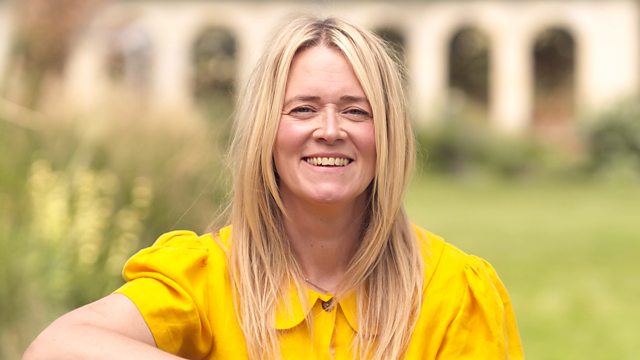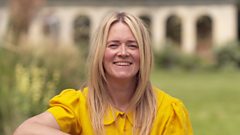
Epilepsy Society
Edith Bowman presents an appeal on behalf of Epilepsy Society, a charity that is transforming the lives of people with epilepsy through scientific research, as well as providing care and support.
Last on
More episodes
Previous
Next
Clip
-
![]()
Edith Bowman's Lifeline Appeal for Epilepsy Society
Duration: 07:54
Epilepsy Society

Epilepsy can happen to anyone, at any age and of any gender or nationality. It is one of the most common serious neurological conditions, where repeated seizures in the brain can turn a person’s life upside down. In between seizures, many people experience anxiety, depression and memory loss.
630,000 people in the UK live with epilepsy and for one third of them – 200,000 – their seizures cannot be controlled by current treatments. One seizure means a person cannot drive and this can affect everything from employment and education to social life. Tragically, epilepsy can also be fatal. 1,200 people lose their lives to epilepsy every year, many of them young people.
The Epilepsy Society supports everyone affected by epilepsy through research, advocacy and care. Our dedicated epilepsy Helpline provides emotional support and information for anyone who needs to talk about their epilepsy. Often people just call the Helpline to cry.
We also have a world-leading team of scientists who are carrying out pioneering research into the causes of epilepsy and how it can be better diagnosed and treated so that every person has the greatest chance of a life free from seizures.
Crucially, a key focus of our research is understanding why, for some people, a seizure can result in sudden unexpected death in epilepsy. We are trying to find clues in the human genome that would suggest a person could be at risk of sudden death. Too many families are left grieving a loved one. By watching and donating to our appeal, you can help us to stop this from happening.
Edith Bowman

Hello I’m Edith Bowman and I feel very privileged to be presenting this Lifeline appeal for the Epilepsy Society. Epilepsy is a cause that I have a personal connection with, I had epilepsy as a child so I know what is feels like to have that constant fear of seizures. I also know how important it is to have a charity like the Epilepsy Society to turn to for help and also support through their dedicated Helpline and even more importantly, for the hope they offer through their amazing research.
Scientists at the charity work tirelessly to understand more about epilepsy and how it can be treated. They are determined to understand why, for some people, seizures can lead to sudden death. But they can’t do it without your help. Please watch our film and donate to this incredible cause. It could literally save a life. Thank you.
Kirsty

Kirsty has had epilepsy since she was six years old. She has six different seizure types and despite undergoing brain surgery, her seizures are uncontrolled. Kirsty’s youngest son, Corbyn, 13, also has epilepsy and her older son, Kirtys, 15, is being investigated for the condition.
Kirsty worries about leaving her house. People have accused her of being drunk as she has come round from a seizure. Others have filmed her during a seizure and posted the video on social media.
Kirsty worries whether she will have a seizure in the night and not wake up in the morning.
She is being treated at the Epilepsy Society’s Chalfont Centre where she feels she receives the very best medical care available. She has taken part in research trials to explore different treatments. And she has been grateful to have been able to turn to the charity’s helpline when she has been at her lowest points.
Hamish and Debbie

Hamish and Debbie do not want any other family to go through the pain and heartbreak that they have experienced. Just days before Christmas in 2018, their beautiful daughter, Amelia was found dead by her sisters Lily and Kitty.
At 21, Amelia had died of sudden unexpected death in epilepsy.
Amelia was vibrant, vivacious, fun-loving and intelligent. Seizures would leave her covered in cuts and bruises and at one point she broke her jaw. But she was determined to enjoy life despite her epilepsy.
Since losing Amelia, Hamish and Debbie have dedicated themselves to raising funds for research at the Epilepsy Society into why, for some people, seizures prove fatal.
They also want to raise awareness of the risk of this tragic outcome. They can’t bring Amelia back, says Debbie, but they can try to make a difference in the future and stop other families suffering as they have.
Evan

GB judo fighter, Evan, has been visually impaired since birth but also started having seizures at the age of four. At 13, his seizures became significantly worse. He was in and out of hospital, couldn’t sleep and was exhausted. Evan found himself in a dark place.
It was only when he was referred to the Epilepsy Society’s Chalfont Centre that things began to change. Epilepsy experts were able to pinpoint the part of his brain where the seizures were coming from. And they were able to prescribe the right type of medication for his seizure type. They also helped him to see how he could help himself through better sleep and nutrition. Evan describes the changes as amazing, and he is now seizure free. He says treatment at the Chalfont Centre gave him back his life, so he can now concentrate on his dream of becoming a Paralympian.
Credits
| Role | Contributor |
|---|---|
| Presenter | Edith Bowman |
| Production Assistant | Megan Sedgwick |
| Production Manager | Katie O'Hanlon |
| Researcher | Melissa White |
| Executive Producer | Hardeep Giani |
| Producer | Arif Mahmood |
| Director | Arif Mahmood |

